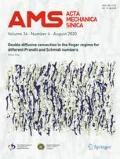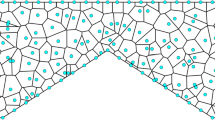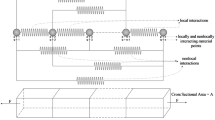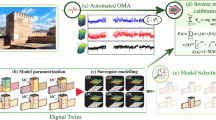Abstract
The aim of this paper is to evaluate the fatigue reliability with hybrid uncertain parameters based on a residual strength model. By solving the non-probabilistic set-based reliability problem and analyzing the reliability with randomness, the fatigue reliability with hybrid parameters can be obtained. The presented hybrid model can adequately consider all uncertainties affecting the fatigue reliability with hybrid uncertain parameters. A comparison among the presented hybrid model, non-probabilistic set-theoretic model and the conventional random model is made through two typical numerical examples. The results show that the presented hybrid model, which can ensure structural security, is effective and practical.
Similar content being viewed by others
References
Gao, Z.T., Xiong, J.J.: The Reliability of Fatigue. Beijing University of Aeronautics and Astronautics Press, Beijing (2000) (in Chinese)
Talreja, R., Weibull, W.: Probability of fatigue failure based on residual strength. In: Proceedings of the Fourth International Conference on Fracture, Waterloo, Ontario, Canada, United States, 1125–1131 (1977)
Kececioglu, D.: Fatigue prevention and reliability. In: Proc. ASME 285–309 (1978)
Talreja, R.: Fatigue reliability under multiple amplitude loads. Eng. Fract. Mech. 11(4), 839–849 (1979)
Lü, H.B., Yao, W.X.: Residual strength model of elements’ fatigue reliability evaluation. Acta Aeronaut. Astronaut. Sin. 21(1), 74–77 (2000) (in Chinese)
Bucher, C.G., Bourgund, U.: A fast and efficient response surface approach for structural reliability problem. Struct. Saf. 7(1), 57–66 (1990)
Yao, W.X., Himmel, N.: Statistical analysis of fatigue data from fatigue life and corresponding truncated residual strength. Int. J. Fatigue 21(6), 581–585 (1999)
Sørensen, J.D., Frandsen, S., Tarp-Johansen, N.J.: Effective turbulence models and fatigue reliability in wind farms. Probabilist. Eng. Mech. 23(4), 531–538 (2008)
Teixeira, A.P., Guedes Soares, C.: Reliability analysis of a tanker subjected to combined sea states. Probabilist. Eng. Mech. 24(4), 493–503 (2009)
Elishakoff, I.: Essay on uncertainties in elastic and viscoelastic structures: from AM Freudenthal’s criticisms to modern convex modeling. Comput. Struct. 56(6), 871–895 (1995)
Ben-Haim, Y., Elishakoff, I.: Convex Models of Uncertainty in Applied Mechanics. Elsevier Science, Amsterdam (1990)
Elishakoff, I.: A new safety factor based on convex modeling. In: Ayyub, B.M., Gupta, M.M. eds. Uncertainty Modeling and Analysis: Theory and Applications, North-Holland, Amsterdam, 145–171 (1994)
Ben-Haim, Y.: A non-probabilistic concept of reliability. Struct. Saf. 14(4), 227–245 (1994)
Ben-Haim, Y.: Robust Reliability in the Mechanical Sciences. Springer-Verlag, Berlin (1996)
Ben-Haim, Y.: Design certification with information-gap uncertain. Struct. Saf. 21(3), 269–289 (1999)
Guo, S.X., Lü, Z.Z., Feng, Y.S.Z: A non-probabilistic model of structural reliability based on interval analysis. Chinese J. Comput. Mech. 18(1), 56–60 (2001) (in Chinese)
Guo, S.X., Lü, Z.Z.: A procedure of the analysis of nonprobabilistic reliability of structural systems. Chinese J. Comput. Mech. 19(3), 332–335 (2002) (in Chinese)
Wang, X.J., Qiu, Z.P.: Robust reliability of structural vibration. J. Beijing Univ. Aeronaut. Astronaut. 29(11), 1006–1010 (2003) (in Chinese)
Qiu, Z.P., Mueller, P.C.: A. Frommer, The new nonprobabilistic criterion of failure for dynamical systems based on convex models. Math. Comput. Model 40(1–2), 201–215 (2004)
Wang, X.J., Qiu, Z.P., Elishakoff, I.: Non-probabilistic settheoretic model for structural safety measure. Acta. Mech. 198(1–2), 51–64 (2008)
Wang, J., Qiu, Z.P.: The reliability analysis of probabilistic and interval hybrid structural system. Appl. Math. Model. 34(11), 3648–3658 (2010)
An, W.G., Cai, Y.L., Chen, W.D.: Reliability Analysis and Optimization Design of Random Structure System. Press of Harbin Engineering University, Harbin (2005) (in Chinese)
Moore, R.E.: Methods and Applications of Interval Analysis. Prentice-Hall, London (1979)
Alefeld, G., Herzberger, J.: Introductions to Interval Computations. Academic Press, New York (1983)
Author information
Authors and Affiliations
Corresponding author
Additional information
The project was supported by the National Natural Science Foundation of China (90816024, 10872017 and 10876100), the 111 Project (B07009) and the Innovation Foundation of Beihang University for PhD Graduates.
Rights and permissions
About this article
Cite this article
Wang, J., Qiu, ZP. Fatigue reliability based on residual strength model with hybrid uncertain parameters. Acta Mech Sin 28, 112–117 (2012). https://doi.org/10.1007/s10409-011-0536-7
Received:
Revised:
Accepted:
Published:
Issue Date:
DOI: https://doi.org/10.1007/s10409-011-0536-7




